Angiopoietin-like 4 confers resistance to hypoxia/serum deprivation-induced apoptosis through PI3K/Akt and ERK1/2 signaling pathways in mesenchymal stem cells
- PMID: 24465718
- PMCID: PMC3897528
- DOI: 10.1371/journal.pone.0085808
Angiopoietin-like 4 confers resistance to hypoxia/serum deprivation-induced apoptosis through PI3K/Akt and ERK1/2 signaling pathways in mesenchymal stem cells
Retraction in
-
Retraction: Angiopoietin-Like 4 Confers Resistance to Hypoxia/Serum Deprivation-Induced Apoptosis through PI3K/Akt and ERK1/2 Signaling Pathways in Mesenchymal Stem Cells.PLoS One. 2018 Mar 12;13(3):e0194448. doi: 10.1371/journal.pone.0194448. eCollection 2018. PLoS One. 2018. PMID: 29529060 Free PMC article. No abstract available.
Abstract
Angiopoietin-like 4 (ANGPTL4) is a potential anti-apoptotic agent for various cells. We examined the protective effect of ANGPTL4 on hypoxia/serum deprivation (SD)-induced apoptosis of MSCs, as well as the possible mechanisms. MSCs were obtained from rat bone marrow and cultured in vitro. Apoptosis was induced by hypoxia/SD for up to 24 hr, and assessed by flow cytometry and TUNEL assay. Expression levels of Akt, ERK1/2, focal adhesion kinase (FAK), Src, Bcl-2, Bax, cytochrome C and cleaved caspase-3 were detected by Western blotting. Integrin β1 mRNA was detected by qRT-PCR. Mitochondrial membrane potential was assayed using a membrane-permeable dye. Hypoxia/SD-induced apoptosis was significantly attenuated by recombinant rat ANGPTL4 in a concentration dependent manner. Moreover, ANGPTL4 decreased the hypoxia/SD-induced caspase-3 cleavage and the cytochrome C release, but increased the Bcl-2/Bax ratio and the mitochondrial membrane potential. Decreased expression of integrin β1, the ANGPTL4 receptor was observed during hypoxia/SD conditions, however, such decrease was reversed by ANGPTL4. In addition, ANGPTL4 induced integrin β1-associated FAK and Src phosphorylation, which was blocked by anti-integrin β1 antibody. ANGPTL4 also reversed the hypoxia/SD-induced decrease of Akt and ERK 1/2 phosphorylation, and the effect of ANGPTL4 was abolished by inhibitors of either integrins, ERK1/2, or phosphatidylinositol 3-kinase (PI3K). Blocking integrinβ1, Akt or ERK largely attenuated anti-apoptotic effect of ANGPTL4. ANGPTL4 protects MSCs from hypoxia/SD-induced apoptosis by interacting with integrins to stimulate FAK complex, leading to downstream ERK1/2 and PI3K/Akt signaling pathways and mimicking the pathway in which MSCs contact with the extracellular matrix.
Conflict of interest statement
Figures

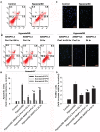
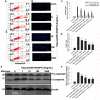

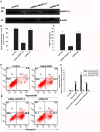
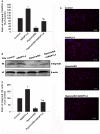
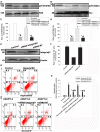
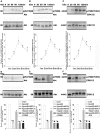
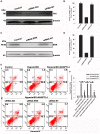
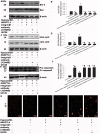
References
-
- Lopez AD, Mathers CD, Ezzati M, Jamison DT, Murray CJ (2006) Global and regional burden of disease and risk factors, 2001: systematic analysis of population health data. Lancet 367: 1747–1757. - PubMed
-
- Orlic D, Kajstura J, Chimenti S, Jakoniuk I, Anderson SM, et al. (2001) Bone marrow cells regenerate infarcted myocardium. Nature 410: 701–705. - PubMed
-
- Stamm C, Westphal B, Kleine HD, Petzsch M, Kittner C, et al. (2003) Autologous bone-marrow stem-cell transplantation for myocardial regeneration. Lancet 361: 45–46. - PubMed
-
- Wollert KC, Meyer GP, Lotz J, Ringes-Lichtenberg S, Lippolt P, et al. (2004) Intracoronary autologous bone-marrow cell transfer after myocardial infarction: the BOOST randomised controlled clinical trial. Lancet 364: 141–148. - PubMed
-
- Hahn JY, Cho HJ, Kang HJ, Kim TS, Kim MH, et al. (2008) Pre-treatment of mesenchymal stem cells with a combination of growth factors enhances gap junction formation, cytoprotective effect on cardiomyocytes, and therapeutic efficacy for myocardial infarction. J Am Coll Cardiol 51: 933–943. - PubMed
Publication types
MeSH terms
Substances
LinkOut - more resources
Full Text Sources
Other Literature Sources
Research Materials
Miscellaneous

